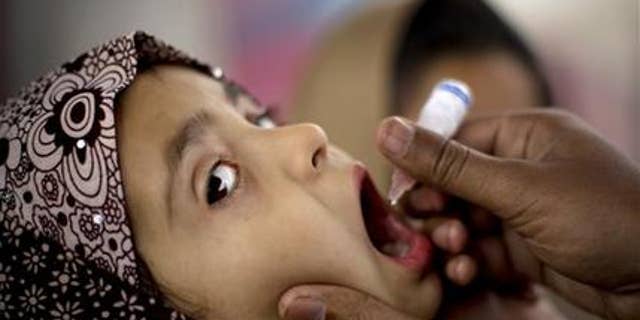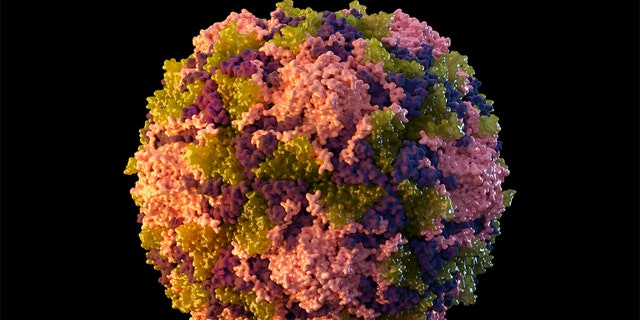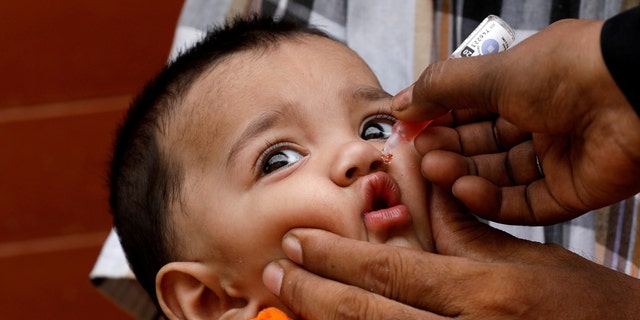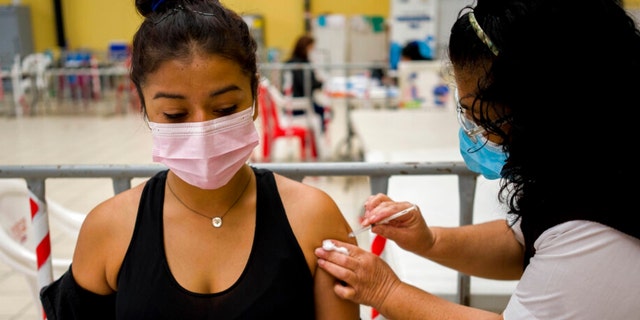Polio live oral vaccine: Here’s why the US stopped using it years ago
An unvaccinated Rockland County, N.Y., resident exposed to an individual who received an oral poliovirus vaccine contracted the neurological disease and is now paralyzed, according to Rockland County and New York State Health Officials on Thursday, as Fox News Digital reported earlier.
The case raises the issue of polio vaccinations — and what Americans should know to protect their health.
“Based on what we know about this case and polio in general, the Department of Health strongly recommends that unvaccinated individuals get vaccinated or boosted with the FDA-approved IPV [inactivated] polio vaccine as soon as possible,” State Health Commissioner Dr. Mary T. Bassett said in a release from the N.Y. State Department of Health that was provided to Fox News Digital.
NEW YORK COUNTY OFFICIAL URGES RESIDENTS TO GET VACCINATED AFTER FIRST CASE OF POLIO IN YEARS
Health officials said on Thursday that the oral vaccine — which contains live strands of the poliovirus — is no longer used in the U.S.
However, it is still used in many countries, including those in Eastern Europe.
Officials could not confirm where the individual who received the oral polio vaccine was from or where the person who is ill encountered this person.
The patient began experiencing symptoms about a month ago; state and county health officials began investigating and contact tracing.
They could not confirm where the individual who received the oral polio vaccine was from or where the person who is ill encountered this person. (The patient’s identity has not been released.)
The N.Y. State Department of Health’s public health laboratory showed “revertant polio Sabin type 2 virus, according to a news release.
The U.S. stopped using the oral polio vaccine (OPV) in 2000 — and instead uses the inactivated polio vaccine (IPV), which does not contain the live virus.
“This is indicative of a transmission chain from an individual who received the oral polio vaccine (OPV), which is no longer authorized or administered in the U.S.”
The release also said, “This suggests that the virus may have originated in a location outside the U.S. where OPV is administered, since revertant strains cannot emerge from inactivated vaccines.”
MOSQUITOES IN HEALTH WEATHER: THE MENACE YOU MUST KNOW ABOUT
The Centers for Disease Control and Prevention (CDC) confirmed these findings as well, the release noted.
Officials said during the conference that the U.S. stopped using the oral polio vaccine (OPV) in 2000 — and instead uses the inactivated polio vaccine (IPV), which does not contain the live virus.

Rockland County Health Commissioner Dr. Patricia Schnabel Ruppert said during the press conference this week that the IPV “does not cause polio.”
She said the IPV used in the U.S. is inactivated and therefore it will not change or mutate.
“So there is no risk of transmission to others,” she said.
What is polio?
Polio, or poliomyelitis, is a viral disease that affects the nervous system. It can cause muscle weakness and in some cases paralysis and death, according to health experts.
Physicians explained to Fox Digital News that the poliovirus typically is transmitted when the contaminated fecal matter of an infected person enters the body through the mouth, usually from hands containing the fecal matter.
It can also occur through respiratory and oral-to-oral transmission through saliva.

Rockland County experts explained during the press conference that polio is very contagious.
A person can shed the virus — therefore infecting others — even when that person does not appear sick.
LONDON SEWAGE SAMPLES CONTAIN POLIO VIRUS, OFFICIALS SAY
An individual can start to show symptoms up to 30 days afterward. Those symptoms can range from mild flu-like symptoms — including vomiting, fever, headache and muscle stiffness — to more severe symptoms such as muscle weakness and even paralysis, according to health experts.
Rupert explained during the conference that children in the U.S. usually receive the inactivated polio vaccine at 2 months of age — then a second dose at 4 months and a third dose between 6 months up to 18 months of age.
Symptoms can range from mild flu-like symptoms — including vomiting, fever, headache and muscle stiffness — to more severe symptoms such as muscle weakness, even paralysis.
They then receive a booster between 4 and 6 years of age. It is a required vaccination prior to attending school.
Dr. Aaron Glatt, M.D., MACP, is chief of infectious diseases at Mount Sinai South Nassau on Long Island, N.Y.
Glatt — also the chair of the Dept. of Medicine at Mount Sinai — is not affiliated with the case in Rockland County, but spoke with Fox Digital News about live vaccines such as the OPV and the possibility of contracting polio from a person who had been given the live vaccine.

“An unvaccinated or immunocompromised person is potentially capable of getting polio in this situation and should avoid being around a person who recently had OPV,” he said.
“Theoretically, polio virus can be shed for up to two months after receiving OPV.”
Glatt explained that in the U.S., health care professionals prefer the IPV so that children will have immunity if exposed to polio without the potential of shedding the virus to others.
CHILDREN ARE MISSING ROUTINE VACCINATIONS DUE TO COVID, UN SAYS
Dr. Jennifer L. Lighter, M.D., an infectious diseases specialist at NYU Langone in New York City, told Fox Digital News that the OPV is still used, since it is seen as an important tool for controlling polio around the world as it is easy to administer, is of low cost and induces mucosal immunity.
In the U.S., health care professionals prefer the IPV so that children will have immunity if exposed to polio without the potential of shedding the virus to others.
The hospital epidemiologist was not privy to details of the Rockland County case but said that OPV can transmit to others.
Lighter said in an email to Fox Digital News, “Rarely (about 1 case in a million), OPV can cause paralysis in children who are immune-compromised. For extremely rare effect in immune compromised children, the U.S. stopped using OPV.”

Lighter cautioned that those who are immune-compromised should speak to their doctor about the vaccinations. The infectious disease expert said that although OPV is not offered in the U.S., some other vaccines such as the measles, mumps, rubella vaccine or the chickenpox vaccine are live attenuated immunizations.
Lighter said that immune-compromised individuals should discuss what measures they should take in the event they need to encounter a child or individual who had any type of live vaccine.
Vaccination against polio is important, Lighter emphasized.
Polio was almost eradicated thanks to the vaccination developed in the 1955.
“Immunization against polio represents one of humankind’s greatest achievements,” she said. “In the U.S. before the vaccine, there were about 50,000 cases of paralytic polio cases and 3,000 deaths in the U.S. each year from polio.”
Health experts with whom Fox Digital News spoke said polio was almost eradicated thanks to the vaccination developed in the 1955.
Almost all children — 99 out of 100 — who get all the recommended doses of polio vaccine will be protected from the disease, according to the CDC.
FOLLOW US ON FACEBOOK FOR MORE LIFESTYLE NEWS
On its website, the CDC said that the U.S. has been polio-free since 1979, thanks to the widespread use of polio vaccine. The CDC also said the best way to keep the disease at bay is to maintain the population’s high immunity against polio through vaccination.
The unvaccinated should talk to their doctors
The N.Y. State Department of Health and the Rockland County Department of Health advised medical practitioners and health care providers to monitor for additional cases.
Those who are already vaccinated are considered to be at lower risk, the officials said.
Health officials said this week they are concerned there may be vaccine hesitancy due to the COVID pandemic.
However, people who are unvaccinated — including those who are pregnant, those who have not completed their polio vaccine series previously or community members who are concerned they have might have been exposed — should consult with their physician about receiving the vaccination.
Health officials said this week they are concerned there may be vaccine hesitancy due to the COVID pandemic.
State and county officials are urging residents to get their polio vaccine.
“Vaccines have protected our health against old and new viruses for decades,” New York City Health Commissioner Dr. Ashwin Vasan said in a news release.
“The fact is, the urgency of safe and effective vaccines has always been here, and we need New Yorkers to protect themselves against completely preventable viruses like polio.”
Pop-up polio vaccination clinics have been established this past week and for next week as well.
Read the full article Here


